It’s hard to miss Eric Migicovsky, even in a crowd. At six feet, five inches, the founder of Pebble Technology usually towers over everyone else.
Migicovsky has reason to walk even taller this week, as Pebble Time, his company’s next-generation smartwatch, racks up Kickstarter preorders at an unprecedented pace.
The new watch, to ship this May, drew almost $9 million from eager buyers within 24 hours of the campaign’s launch Tuesday morning, and obliterated its $500,000 goal in a mere 17 minutes – a new speed record for the crowdfunding platform (if you want a feel for the pace of orders, I shot this two-minute video shortly after the campaign launched).
When Pebble turned to Kickstarter the first time in April 2012, it raised more than $10 million in just over four weeks, setting the record for most-funded project, which stood until last summer.
The success of that first campaign culminated in sales of one million Pebble watches by the end of 2014.
Tall as Migicovsky is, his low-key affability neutralizes any notion of a guy looking to dominate others with his personality. It seems he’d sooner let his pioneering product – and the quiet, steady focus he has brought to developing it, despite a looming storm of competition – do the talking for him.
I had hoped to catch up with Migicovsky this week, but it was an admittedly faint hope given the whirlwind enveloping Pebble’s latest Kickstarter success. So, I turned to Vidyard co-founder Michael Litt, who shared a house with Migicovsky – and others who would go on to startup success – back in 2009, when they were studying systems design engineering at the University of Waterloo.
That house, which Litt and his older brother, Stephen, had bought on Batavia Place in Waterloo, is where Migicovsky worked on Pebble’s precursor, Allerta Inc., and assembled the inPulse Smartwatch. It was a BlackBerry-tethered device he had dreamt up during a year of overseas study at Delft University of Technology in the Netherlands, then launched to during his stint in UW's Velocity "dormcubator."
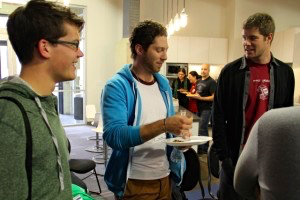
Left to right: BufferBox co-founder Mike McCauley, Vidyard co-founder
Michael Litt and Pebble founder Eric Migicovsky at Communitech’s
Techtoberfest in 2012. All three attended Y Combinator.
(Communitech photo: Anthony Reinhart)
Batavia House, as it was known, also served as the set for the video Migicovsky shot when he applied to Y Combinator, the sought-after Silicon Valley startup program. As the first Waterloo Region startup to attend YC, he blazed a trail for Litt and a succession of UW-spawned companies that continues today, and has played a vital role in putting Waterloo's startup community on the global map.
In 2011, as Litt and co-founder Devon Galloway returned from YC to Waterloo Region to build Vidyard into a fast-growing, venture-backed video marketing platform, Migicovsky remained in California, where inPulse evolved into the Pebble, and basically launched the current smartwatch market.
Much larger players have since joined the fray, among them Samsung, Sony, LG and soon enough, the biggest of them all, Apple. Still, Pebble is widely regarded as the best smartwatch on the market today for its simplicity, functionality and battery life.
Based on the insights Litt shared with me on Wednesday morning, it would seem foolish to write off Pebble, even as Apple gears up to release its slick (and considerably more expensive) watch this year.
Among other things, these insights speak to the value of focus, discipline and knowing your customer when building a company.
Q – The Pebble Time Kickstarter campaign is sitting at $8.7 million right now, less than 24 hours after it launched. What does that tell you, not only about the product, but about Eric Migicovsky as you know him?
A – Eric is a die-hard creator. Having lived with him in university, you don’t really realize what certain qualities mean in an individual until you see those qualities bloom into something productive.
Eric was always an incredibly focused, incredibly mindful, very creative, hardworking individual, and he had a very broad skill set around both design and engineering.
To see him come out of university, go to Y Combinator . . . he was kind of the beacon for us to go to Y Combinator, as we would have been for BufferBox, and as BufferBox would have been for Thalmic. He was the first one.
I remember him filming his Y Combinator application video in the back room of the house, where he was manufacturing watches with high school labour from WCI (Waterloo Collegiate Institute) up the street.
He got in and it was an incredible experience, but even after YC – and it’s kind of the secret of YC – he didn’t have huge, huge, huge immediate success. He didn’t raise a ton of money immediately.
He continued working on that watch, and the Pebble was an accumulation of all of his learnings from the inPulse Smartwatch. He had lots of failings, lots of learnings, and delivered an amazing product that shocked the world. That’s the perspective I had.
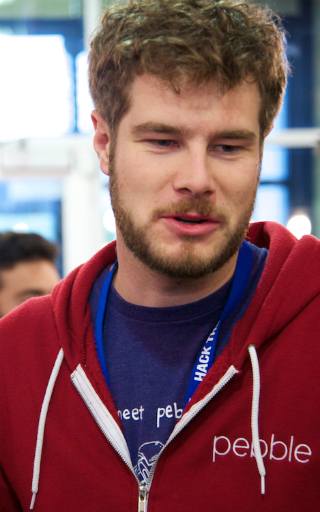
Pebble founder Eric Migicovsky at a Communitech
reception in September 2014.
(Communitech photo: Anthony Reinhart)
I remember being at their house in Palo Alto when they launched the last Kickstarter. It was the second day in and it was just blowing up, and I was playing with a prototype of the watch, and I actually Instagrammed a picture of it.
It was still wired up to a machine; it wasn’t a fully functional, standalone device. But he delivered on the promise and more, which many, many Kickstarter campaigns haven’t been able to do. And he built a foundation of great customer service, great product design, a huge developer ecosystem for customization.
That watch certainly catered to a certain type of individual, and that type of individual is Eric. He built the product for himself, to solve his problems, and found millions of other people that had the same desire, and he’s never, as far as I know, deviated from that course.
It certainly feels like this now, and it’s much easier to say now than ever, but Eric was always one of “the guys.” When you think about some of the really successful people in our space – like Zuck, Larry, Sergei, obviously Steve Jobs – there’s a level of eccentricity and focus and conviction that is hard to match. Unless you actually are that way, people can’t replicate that. That’s who Eric is, and it’s awesome to see him be so successful.
Q – I read a piece yesterday about Eric, in which he was interviewed the day after Apple announced the Apple Watch last fall. The interviewer expected him to be shaken or distracted, but instead, he was upbeat and calm, as if nothing had happened. What does that say?
A – Eric never, ever, ever struck me as the type of person who cared about money. A big contender like Apple coming into your space and essentially shitting on your parade would create fear for someone who wasn’t all about innovation, wasn’t all about customers, wasn’t all about their product.
He knows things about what they’re working on and what they’re building, and their customer base, that no one else knows, including Apple. That blind confidence is a) what’s required to lead this team successfully through this next product revision, and b) what’s required to probably help him go to sleep at night.
I don’t know if he ever really was irked by that announcement; he’s just not the kind of guy who would be. He has stayed true to the course, and has developed another amazing product, which I’m a proud backer of.
I wouldn’t buy an Apple Watch.
Q – Did you order a Pebble Time yesterday?
A – Yes.
Q – Tell me how you met Eric.
A – Eric knew my brother through the engineering society, and we’re kind of three in a line of systems design engineering grads. My brother was ’07; I think Eric was ’09 and I was ’11, so there were two years separating each of us.
He lived with us at Batavia and started a company at Batavia. This would have been in 2009.
He lived at Batavia all the way through to going to YC, so through fourth year. His fourth-year design project was the inPulse Smartwatch. Then he moved out to California for YC and never came back.
There were a bunch of systems guys living (at Batavia House).
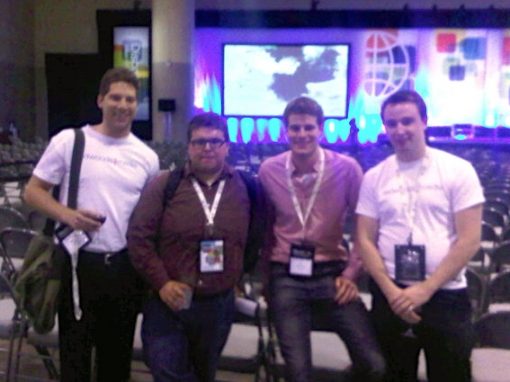
Left to right: Housemates Michael Litt, Andrew Finkle and Eric Migicovsky
with Devon Galloway (Litt’s Vidyard co-founder) at a conference in
Toronto in 2010. (Photo courtesy Michael Litt)
Q – What, if anything, set him apart from everyone else in the house?
A – I haven’t really thought about this too much, but it’s interesting; you’ve got seven guys together in a house.
My brother was building a real estate portfolio; I was building Redwoods Media, Eric was building inPulse, Fink (Andrew Finkle) lived there just before Structur3D Printing, and there was a guy named Jean-Michel who was friends with Eric and Fink.
We hung out, we partied, we drank beer. But the one thing I’ve got to say about Eric is that he was always the reserved one, to some degree; a little more thoughtful, and certainly an independent individual.
Q – What did you learn from him that you’ve applied to your own approach to entrepreneurship?
A – The importance of focusing on the one thing that you think really matters, and trusting yourself to believe that it’s important.
Every entrepreneur builds technology and runs into individuals who might have more experience, and pull them in many different directions. That’s often the death of the entrepreneur and the death of the company.
YC has this mentality of, when you’re starting a company, anything that looks like it would be in a movie – like interviews with people, grabbing coffee with people, meeting lawyers, accountants, reporters, all that stuff – is just wasted time and energy in those early, early stages, because you have conviction to build something, and until you can test that with your market, you have no idea if it’s going to be successful or not.
If you get distracted, being pulled in 50 different directions before you get there, your product will be a blended version of what you originally intended it to be and not do anything well, and not fill any gap in the market.
When I see Eric’s Kickstarter, I can’t help but reflect on my own initiatives and wonder if we are being as focused as we could be.
Q – So simply seeing what he’s doing makes you check yourself a bit?
A – Oh yeah.
He’s still doing the same thing he was doing. In the Kickstarter campaign, they talk about how they have seven years of watchmaking experience, and I saw the very beginning of that.
He’s doing the exact same thing he was doing back then, just on a much larger scale.
How cool is that?
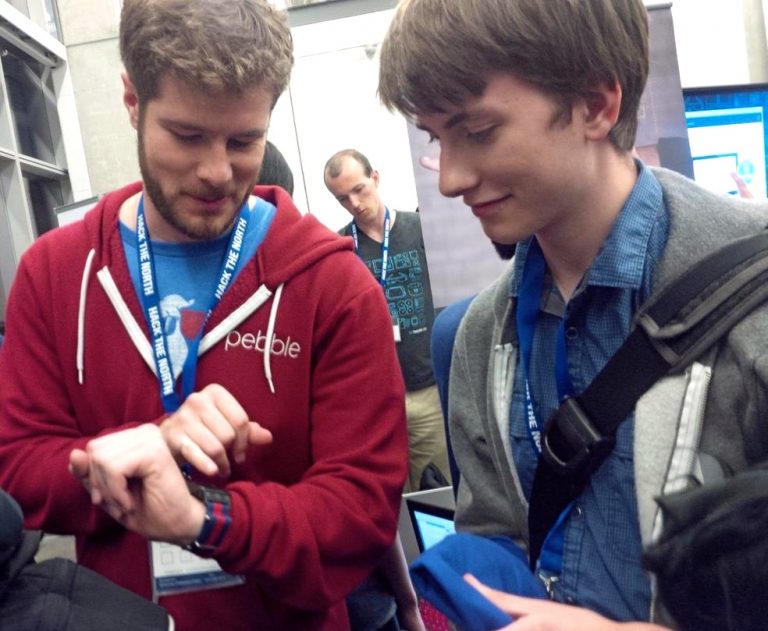
Eric Migicovsky demonstrates his Pebble watch for an attendee at
Hack the North, a hackathon held at University of Waterloo
in September 2014. (Communitech photo: Anthony Reinhart)
He wanted to make a smartwatch. He certainly had different ideas on the direction it could go, but since then he has really just focused on what matters most.
If you think about all the best entrepreneurs and all the biggest companies, people didn’t understand what they were doing, they were maybe a little too early and the market developed around them, they stayed the course and were successful.
There are thousands who stayed the course and weren’t successful, and their predictions didn’t come true, but you rarely hear of a company that switches direction 50 times and makes it as big as he has in such a short period of time.
You hear about these crazy pivots that helped a company find its product-market fit and are a huge success, but they stay that course.
Q – With Apple out there, about to release its smartwatch, and everyone else getting into the game, how do you see this playing out?
A – I have no idea.
It’s pretty clear that there’s a heavy demand for what Eric is doing. I’ve seen a lot of Galaxy Gear watches out there, and I’m sure there’s a contingent of people who are going to be all over the Apple Watch.
The one thing that Eric has nailed in the wearable and accessory world is battery life, and that’s where I think the Galaxy falls short. And given how terrible the battery life is on my iPhone, I’m assuming Apple’s not going to get that right, either.
That’s the biggest challenge with wearables. I wore my Fitbit until I needed to charge it, because when you charge it, you’ve got to remove the little Fitbit from the rubber case, and find your very special charger that only works with your Fitbit, and which you probably lost on Day 3. And so, as soon as I needed to charge it once, I stopped wearing it.
Eric’s device is something you charge while you’re sleeping at night, and it has a seven-day battery life, so it’s something that you don’t need to stay on top of.
It also has a very convenient, consistent utility, in that it always gives you the time.
The new timeline UI looks incredible. It makes a ton of sense with respect to how you see updates throughout your day.
I can’t wait to experience that.
I think he’s just making more relevant wearable tech than anybody else in the world. If the Internet of Things and wearables is truly a category, I can’t help but think that he will be incredibly successful.
You could look at his success alongside early-days BlackBerry and early-days Apple. He’s going to develop a device that is cool to have, everybody needs it, it has definable utility, and there are a lot of competitors.
Palm was well-established when the BlackBerry came along; BlackBerry was well-established when the iPhone came along. In BlackBerry’s case, Apple was a big company launching a new product line, but he’s the disruptor; he’s created a new status quo.
Q – Are there some similarities with BlackBerry here, in that he’s the upstart from Waterloo who basically invents a new market, being the smartwatch market, and now has Apple about to launch into the same space?
A – I think in this particular case, Eric’s eye is very much on the ball. I think that’s the big difference, and it goes back to that element of focus.
He’s not trying to buy a hockey team; he’s not trying to get Dr. Dre or Eminem or whoever’s popular at the moment to use the device. Maybe he is, but that’s not what it’s all about. It’s all about every single consumer who is using his product, and learning from them.
It’s a very modern perspective on product development, and Eric has this innate ability to focus and be consistent. And that’s what makes him an incredible leader.
I mean, a solo founder – that’s a remarkable feat in itself.
I can’t say enough good things about Eric.
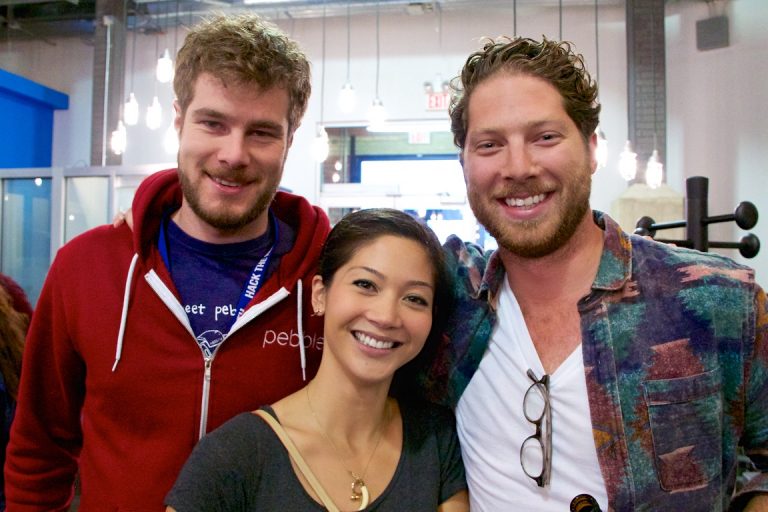
Eric Migicovsky, Donna Litt and Michael Litt at a Communitech reception
during the University of Waterloo’s Hack the North in
September 2014. (Communitech photo: Anthony Reinhart)
Q – Anything else you’d like to say?
A – I think it’s inspiring, and there’s definitely a story here around commitment and focus; staying the course despite what people say and think and do.
It’s about not caring about money; it’s about being about innovation, being about solving problems, being a creator and not a consumer, all that stuff that he is are the reasons why he’s ultimately been successful. And not being afraid to go back to basics.
I mean, going back to Kickstarter for the second launch of the product was brilliant.
When I first saw it, my immediate reaction was that I don’t understand why he would do this, but that was his original audience. That would be like BlackBerry going back to businesses and saying, ‘Hey, we’re going to do exactly what you’ve been asking us to do for the last three years, since you bought our first product, and we’re going to ask you to support us in this initiative. Are you willing to put your money on the line, before you see the product, and buy into us because we’re buying into you?’
That’s the way to build a company. That’s the holy grail, and Kickstarter is just a conduit for that.
Q – It’s validation writ large, not validation decided by a few guys in suits on Sand Hill Road.
A – Yes. The community that these companies grow in is a community that loves them and champions them and supports them, until a point. Then you cross this threshold of being a success story, and people want to see you fail, and so you start hearing negative connotations about the companies that are doing very well, companies that have delivered a product or are delivering a product and nobody knows what’s coming next.
That was certainly going on with Pebble. Everybody’s like, ‘Oh, the Apple Watch is going to kill them’ or ‘the Galaxy Gear is going to kill them.’ And Eric doesn’t give a shit about what anybody says, or how that makes him feel, I honestly believe. He goes out and develops a better product than anybody, with all the learnings he has, and his previous success, and he ultimately succeeds.
He’ll probably ship that watch before the Apple Watch does. It’s supposed to ship in May, and he’s known that, probably, and that’s a source of confidence.
Anthony Reinhart is Communitech’s Director of Editorial Strategy and senior staff writer. View from the ‘Loo looks at the issues, people and events that shape Waterloo Region’s technology sector.

